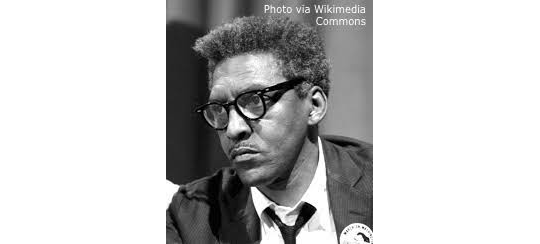This week’s historical figure hits close to home: social rights leader Bayard Rustin was born in West Chester, Pa. Rustin led movements in support of civil rights, socialism, nonviolence and gay rights, among others. He grew up in a house of 12 children, where National Association for the Advancement of Colored People (NAACP) leaders like W.E.B. Du Bois and James Weldon Johnson were frequent visitors, encouraging Rustin to engage in activism against Jim Crowe laws early in life. In college, he continued his career based on “social dislocation and creative trouble” (his own words), facing expulsion after organizing a strike.
Along with the Fellowship of Reconciliation (FOR) activists A. Philip Randolph and A.J. Muste, Rustin proposed a march on Washington in 1941 to protest racial segregation in the armed forces and employment discrimination. He met with President Franklin Roosevelt to tell him a march would occur unless the group’s goals were met. The march was canceled, against Rustin’s advice, after Roosevelt issued the Fair Employment Act. The U.S. Armed Forces were not desegregated until 1948 under an Executive Order by President Harry Truman.
In 1941, Rustin traveled to California to help over 120,000 Japanese-Americans in internment camps, which earned him the position of Secretary for Student and General Affairs with FOR. A trailblazer in the effort to desegregate public transportation, Rustin sat in the second row of a bus en route to Nashville, Tenn. in 1942. He refused to move and was arrested and beaten by police. He later helped form the Congress of Racial Equality (CORE) with George Houser, James L. Farmer Jr. and Bernice Fisher. He and other members of the group refused to join the military based on pacifist beliefs. As a result, Rustin was imprisoned for around two years, which did little to stop his activist work; he organized protests against segregated dining facilities and organized the Free India Committee. Throughout his activist career, he would frequently be arrested for protesting against British colonial rule in India and Africa.
In 1947, Rustin and Houser organized the first of the Freedom Rides, termed the Journey of Reconciliation. Sixteen men traveled for two weeks, risking abuse and arrest. Rustin faced persecution not only for his skin color, but his sexuality as well. He was arrested and served 60 days in jail in 1953 for “sex perversion,” the official name for homosexual activity in California at the time. He was fired from FOR as a result.
The most well-known demonstration Rustin was part of was the historical 1963 March on Washington, of which he was the chief organizer. Bayard Rustin deserves recognition as a hero, and someone who persisted and prevailed in the face of adversity. Check out Celine Butler’s “Hometown Heroes” article on the Quad’s website to learn more!
Caroline Fritz is a fourth-year student majoring in English with minors in linguistics and French. CF853302@wcupa.edu


Thank you for this.
Bayard Rustin planned the March; brought non-violence to the Movement; inspired the Freedom Riders-
He even brought us the peace symbol!
Still lost to history, shunned & shamed because of who he was, whom he loved
This cannot happen again
so swears the
Bayard Rustin Center for Social Justice.
Please join us & learn more about our mission~
http://www.RustinCenter.org